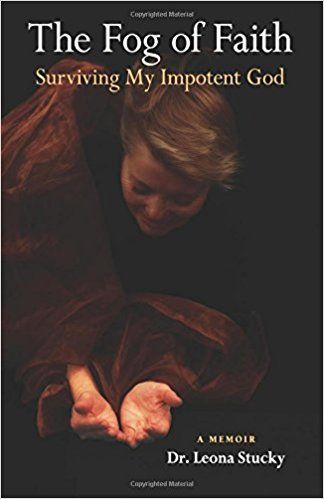WOW! Presents: THE FOG OF FAITH by Dr. Leona Stucky

ABOUT THE BOOK
After the trauma of a savage attack, a farm girl recovers physically, but her identity, faith, and relationships are shattered.
This is the true story of Leona Stucky’s childhood on a Kansas farm, surrounded by a loving family and the simple tenets of her Mennonite community. Violence enters her world in the guise of a young man who seems normal to everyone else but who Leona knows to be deranged in his obsession with her.
His unrelenting abuses take root, and Leona must deal with them utterly alone. Her pacifist father cannot avenge or protect her, nor can a callous justice system. Even God is impotent.
Leona is cast into a bewildering life of disgrace and poverty—with a baby, a violent husband, and battered faith. Through a series of page-turning events, she hacks through the bones of her naïveté to confront harsh realities and to probe the veracity of religious claims.
The Fog of Faith is a suspenseful and morally unflinching drama of shame and survival, as well as usable and unusual wisdom.
This edition includes thoughtful questions for readers and groups to further explore their own stories.
BOOK DETAILS:
PURCHASE LINKS:

Dr. Leona Stucky
She fit bucking bales into God’s plan, but bucking fear left this Mennonite farm teen begging and now, after 30 years as a professional psychotherapist, Dr. Leona Stucky narrates her unflinching faith-and-violence dilemma in a riveting memoir, The Fog of Faith: Surviving My Impotent God, which spares neither God nor violence against women and has been recommended by MS Magazine.
Dr. Stucky first received a degree in psychology and philosophy from Boston College, graduating summa cum laude, before plunging into seminary, first at Andover Newton Theological School and then at Eden Theological Seminary. She earned a doctorate from Southern Methodist University with honors, and a Diplomate certificate from the American Association of Pastoral Counselors—their highest credential—for teaching, supervising, and offering therapy services. She currently has standing as a Unitarian Universalist community minister.
These professional explorations might have quieted her mind, but the areas where integration seemed impossible became mental sand kernels disrupting many intellectual resting places. Being fiercely honest in confronting contradictions, she honed her wisdom, gained unusual insights, and enjoyed a professional and personal journey that could only be shared by telling the whole story. After numerous failed attempts, Dr, Stucky finally completed The Fog of Faith: Surviving My Impotent God.
The provocative title aptly indicates the unflinching moral dilemmas she reveals. The gripping story reads like a real-life thriller that readers can’t put down. Still, each step grounds itself in nuanced networks of passion, relational complexities, cultural and religious dilemmas, circumscribed choices bound by woman’s poverty, persistent violence, and an untamable resilient desire to redeem herself with or without God.
Connect with NAME at these sites:
GUEST POST
We looked enough like a normal Midwest farm community that you might not guess we were Mennonite unless you knew our history, motives, thought processes, or noticed our controlled impulses and abundant gentleness. What you couldn’t see revealed the most about us. Underneath our disciplined exterior burned passion. We focused it on doing what Jesus wanted.
Our faith, the well from which we drank our identity, defined what our lives should be. We learned how to judge each event and where to place our trust. We knew another world loomed out there, a bad one that often dismissed our re-purposing of Jesus’s sermon on the mount. My family didn’t touch or taste that world, and seldom did that world intersect ours. Being held in Jesus’s love and resting in His arms was poignant enough for us.
– The Fog of Faith: Surviving My Impotent God
Perhaps the one identity in which we were allowed to show pride, and not feel sinful about self-promotion, was in being Mennonite. That was the right thing to be and as a young girl I was certain I could be proud of that and of having a long line of forbearers who were also Mennonite as far back as anyone could remember or discover, on both sides of my family. I thought of myself as Mennonite through and through and had no desire to be anything else, in fact, I couldn’t have guessed what ‘anything else’ might have been, other than wrong in the eyes of God.
And, as is characteristic of most faith stories, when doubts or cognitive dissonance ruffled my brain, I found ways to get back into the straight and narrow, at least for a long time.
Here is the story of one such experience told in The Fog of Faith.
One Sunday when I was seven, our tribe came to church late. Embarrassed, Dad and we big kids—Mom tended her babies in the nursery—tiptoed into an empty pew at the back of Hopefield Mennonite Church. I was expecting another mind-numbing repeat of the good things we’d heard and said before. Dad pretended to tickle me, and I squirmed and slid down the pew to escape.
“Da-a-ad,” I whispered, giving his title three syllables. “We’re supposed to be quiet. You’re not helping!” Gradually I settled into boredom, until the spoken word about the Biblical David sounded a discordant note.
“What does this mean?” I mumbled to Dad. “David did all those bad things and God helped him? God even made him kill a giant and lots of other people?”
He shushed me, but my thoughts ran wild. Didn’t God tell us never to kill anybody? Wasn’t that our Church’s point? We didn’t believe in killing anyone, not even bad people! I was guessing that God was no better than the rest of the evil world, when a safer idea landed—this must be a bad minister who preached bad stories about a bad God. How dare the preacher tell us that God is not as good as Mennonites!
I poked Dad’s side and said, “How come our minister says that God does bad things, even killing people?”
“Honey, he’s asking us to think about things a little differently.”
“It’s more than a little different if you say God likes killing! Isn’t that what the rest of the world thinks? Those who go to war? I thought we weren’t supposed to like killing. That’s what the Bible tells us.”
Dad’s red face sprouted purple lines. Beads of sweat rolled down my back. I stood up, thinking I might run.
“Is what he says about David actually in the Bible?” I continued.
“Yes, it’s in the Bible, but in the Old Testament, in a time before Jesus.”
“Are you saying that God was mean before Jesus came, but then He got nice?”
“Sort of like that,” Dad said, motioning for me to sit down and hush up. I wanted to stomp my foot so bad it ached from holding it back. I sat with my arms crossed, fingers digging into my skin, and glowered at our minister.
But I considered that I was in church and I should be kind. Because … Because … Jesus wanted me for a sunbeam. I was no dumb bunny. I knew that for sure.
I should also confess to you blog readers that when I was young, and throughout most of my life, I harbored a deep desire to be a good girl. Few things are more boring to readers than good girls. As the old adage says, good girls don’t make history.
That simple fact separates my memoir from most other stories. I am not a heroine. I did not inherit a swift and decisive mind, a strong will that demanded others conform, a sense of justice that made me react instantly when I was marginalized, a body build that allowed me to win at sports, or an extroverted demeanor that dominated discussions and the moods of people around me. No. The classic heroine lives at the opposite end of the personality spectrum from where I land.
Thus you, as a reader, are in for an unusual experience if you pick up the book. Readers say that once they start the memoir they can’t put it down – that it moves fast and is thrilling and scary each step of the way. But the speed, I can assure you, has nothing to do with the grounded molasses that is me. I’m guessing that partly due to my lack of heroine qualities, Ms. Magazine calls The Fog of Faith a great summer read, and some critical reviewers have called it both a fascinating story and an important read. I wonder what your experience will be.
Praise:
The voice of this woman’s spirit and courage rings clearly as she faces the personal challenges of her faith—when the adversity in life tests the veracity of her beliefs against the reality of terror. This book is an important, insightful book that I highly recommend.
– Michael Paymar, author of Violent No More: Helping Men End Domestic Abuse
Naked with fear, aflame with rage, at once heart-pounding and heart-breaking, this true tale climbs from the wheat fields of Kansas to the promised Heaven above—and down again.
– Robert Mayer, author of The Origin of Sorrow, The Dreams of Ada, Superfolks, and other books



